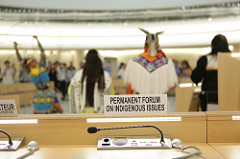Note: This course is also offered as part of the Professional Development Diploma on Sustainable Development and Human Rights.
Course Description
This certificate course offered by the Human Rights Center of the University for Peace will introduce participants to the increasingly significant field of indigenous peoples’ rights and looks at the contemporary issues that have paradoxically led to a recognition of those rights on the one hand, while simultaneously challenging their implementation on the other. The course will address the broad spectrum of issues involved in the field of indigenous peoples’ rights, beginning with who qualifies to be “indigenous peoples”, the scope of their right to self-determination, the international and regional legal frameworks for the protection of their rights and the challenges associated therewith, and the debates surrounding the concept of indigenous governance. The course will also look closely into human security and human development issues relating to indigenous peoples, the role of investment, extractive industries and other business corporations in indigenous reservations/areas, and the effect of intellectual property rights on the traditional knowledge of indigenous peoples. Strong emphasis will be placed throughout the course on case studies from around the world. Participants will explore debates on mainstreaming versus autonomy, participatory governance, scope of ‘free and prior consent’ and the right to development, amongst others.
The course is based on a dynamic pedagogy including reading materials, video clips, case studies, and interactive webinars with the instructor.

Course Outline
- Week 1: Indigenous Peoples, Indigenous Identity and the Right to Self-determination
- Week 2: International and Regional Legal Framework for Indigenous Peoples’ Rights
- Week 3: Indigenous Governance
- Week 4: Indigenous Peoples, Human Security and Human Development
- Week 5: Indigenous Peoples Rights and Investment
- Week 6: Traditional Knowledge, Intellectual Property Rights and Indigenous Peoples
Who Should Apply
The course is intended for staff members of civil society organisations and (inter)governmental organisations involved in advocating for indigenous peoples’ rights, academics and others interested in the human rights of indigenous and tribal peoples, as well as for those working in the field of development. Candidates should have a good written command of English and have high competence and comfort with computer and Internet use.
About the Instructor
Dr. Mihir Kanade (India) is Director of the Human Rights Centre of the University for Peace (established by the UN General Assembly). He is the Academic Director of UPEACE and the Head of its Department of International Law. He is also an adjunct faculty at Universidad Alfonso X El Sabio (Spain), Cheikh Anta Diop University (Senegal), Long Island University (LIU Global Centre in Costa Rica), and Universidad de Los Andes (Colombia). Dr. Kanade serves as the academic co-coordinator of the LLM programme in Transnational Crime and Justice offered at the United Nations Interregional Crime and Justice Research Institute, Turin, Italy. He also serves on the International Advisory Board of the International Bar Association on the topic of Business and Human Rights. Dr. Kanade currently serves as an independent expert of the United Nations Human Rights Council on the Expert Mechanism on the Right to Development. Dr. Kanade co-leads an e-learning project in partnership with the UN Office of the High Commissioner for Human Rights and UNU-IIGH for training UN staff and diplomats of permanent missions of States on operationalizing the Right to Development in Implementation of the SDGs. He also chairs the drafting group of international experts appointed by the OHCHR for preparing a legally binding instrument on the right to development. His principal area of academic research and study is the interface between globalization, governance, public international law and human rights, covering several themes including trade, business and investment, sustainable development, forced displacement of people, indigenous peoples’ rights, public health, amongst others. He conducts several trainings for staff of intergovernmental, governmental and non-governmental organizations, as well as professionals, in the field of international law and human rights. Prior to academia, Dr. Kanade practiced for several years as a lawyer at the Bombay High Court (Nagpur and Bombay benches) and at the Supreme Court of India. He holds a LL.B from Nagpur University (India) and a Master degree and Doctorate from UPEACE. Dr. Kanade also co-led for several years a field course on indigenous peoples’ rights in Costa Rica. He also teaches a course on this topic in the MA programme in International Law at UPEACE.
Course Fee
For Certificate: Fee for taking this course is USD 600. UPEACE students and almuni enrolling for the Certificate course are entitled to 30% discount on the fee.
For Auditing: It is also possible to audit the course, in which case, participants will not receive a certificate. Auditors, however, will have access to all course material, be able to participate in the synchronous webinar sessions, and be able to monitor the online discussions of participants. The fee for auditing the course is USD 200.
For Certificate and 2 Academic Credits: Participants are also able to take the course for two academic credits offered by UPEACE. The cost of taking the course for 2 academic credits is USD 1100.
Application Procedure
To apply, please fill up the enrolment form. Applicants will be contacted within three working days of the application. The diploma is limited to 25 participants.
Payment
Payments may be made either by credit card or by wire transfer. Payment by wire transfer usually takes three to four business days to be deposited in our account. Payment by credit card is instant.
If you wish to make the payment by credit card, please go to https://upeace.org/payments-hrc/
Payments by wire transfer must be made to the following bank account:
Universidad para la Paz
Banco Nacional de Costa Rica
Bank account number:100-02-099-600195-4
Swift Code: BNCRCRSJ and IBAN: CR57015109910026001958
Avenidas 1 y 3, Calle 4
San José, Costa Rica
Our withdrawal and refund policy.
